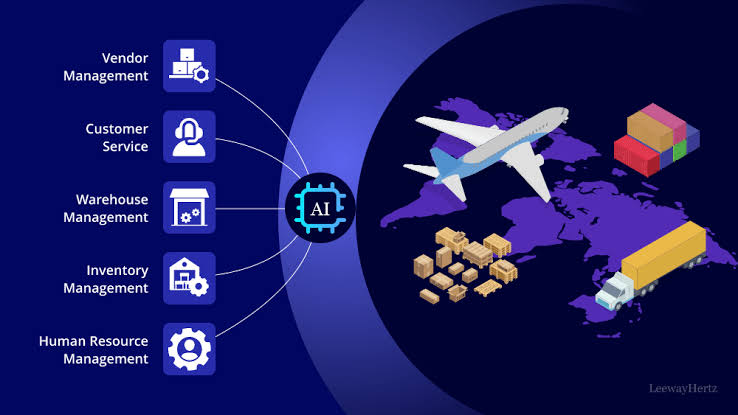The logistics industry has undergone a massive transformation in recent years, with artificial intelligence becoming one of the most important drivers of change. From streamlining operations to enhancing customer satisfaction, AI has become a crucial tool that helps logistics companies remain competitive in a rapidly evolving market. The ability of AI to process large amounts of data, make accurate predictions, and optimize decision-making has placed it at the heart of supply chain management.
Improved Supply Chain Efficiency
One of the major benefits of using artificial intelligence in logistics is its ability to enhance overall supply chain efficiency. Logistics networks are often complex, involving transportation, warehousing, and delivery operations that must be coordinated seamlessly. AI helps by analyzing data from multiple sources to create more efficient workflows.
- AI-powered route planning reduces travel time and fuel costs.
- Predictive analytics helps in anticipating demand and preventing bottlenecks.
- Automated warehouse management systems optimize storage and inventory handling.
By eliminating inefficiencies, companies save time and resources, which directly impacts profitability and service delivery.
Enhanced Demand Forecasting
AI has also proven valuable in improving demand forecasting. Traditional forecasting models often fail to account for sudden changes in consumer behavior, seasonal trends, or global disruptions. Artificial intelligence, however, leverages big data and machine learning algorithms to provide more accurate predictions.
- AI systems analyze historical sales data, market trends, and even social media activity.
- Real-time updates allow companies to adjust production and distribution quickly.
- Businesses can avoid overstocking or understocking, reducing unnecessary costs.
This ensures that companies are better prepared to meet customer demands while minimizing waste and storage expenses.
Optimization of Delivery Routes
Delivery operations form the backbone of logistics, and AI plays a key role in ensuring these processes are efficient. Route optimization powered by AI considers traffic conditions, weather patterns, and delivery windows to determine the best possible paths.
- AI enables real-time rerouting to avoid traffic jams or accidents.
- Delivery times become shorter, leading to better customer satisfaction.
- Companies reduce fuel consumption, which also supports sustainability.
This benefit is particularly crucial for e-commerce businesses where fast and reliable delivery is a competitive advantage.
Improved Warehouse Management
Artificial intelligence has revolutionized warehouse management by introducing automation and smart technologies. AI-driven robotics and automated sorting systems reduce the need for manual labor, leading to faster and more accurate operations.
- AI-driven robots assist in picking, packing, and sorting products.
- Smart sensors track inventory levels in real-time.
- Machine learning identifies patterns to improve warehouse layout and workflow.
These systems minimize human error and ensure smooth operations, ultimately improving the accuracy of deliveries and reducing costs.
Better Risk Management
Risk management is a critical aspect of logistics, and AI provides businesses with advanced tools to handle uncertainties. By analyzing data on market trends, weather forecasts, and geopolitical factors, AI can predict potential disruptions and suggest mitigation strategies.
- AI systems alert companies about possible supply chain delays.
- Predictive modeling helps businesses prepare contingency plans.
- Fraud detection tools powered by AI safeguard transactions and financial activities.
Such proactive measures allow logistics companies to remain resilient in the face of disruptions.
Enhanced Customer Experience
Customer satisfaction is at the heart of logistics operations, and AI contributes significantly to improving customer experience. With AI, customers receive better visibility into their orders and faster resolutions to queries.
- AI chatbots provide instant customer support around the clock.
- Real-time tracking keeps customers informed of delivery progress.
- Personalized services, such as preferred delivery times, can be offered.
These features strengthen customer trust and loyalty, giving businesses a competitive edge in a crowded market.
Cost Reduction and Resource Optimization
AI helps logistics companies reduce costs by optimizing how resources are used. From reducing fuel consumption through route optimization to minimizing storage costs through demand forecasting, businesses benefit financially across the supply chain.
- Automation reduces labor costs in warehouses.
- AI minimizes losses from damaged goods through predictive maintenance of vehicles.
- Smarter resource allocation leads to better overall productivity.
This cost-effectiveness enables logistics firms to invest more in growth and innovation.
Sustainability and Green Logistics
With growing pressure on businesses to adopt sustainable practices, AI has become an enabler of green logistics. AI-powered solutions help companies track carbon emissions, reduce fuel usage, and implement eco-friendly strategies.
- Smart route planning cuts down on fuel consumption.
- Automated warehouses use energy more efficiently.
- Data insights support decisions on greener packaging and transportation methods.
By aligning with sustainability goals, logistics companies not only reduce environmental impact but also improve their public image.
Future of AI in Logistics
As technology continues to evolve, the role of AI in logistics will expand further. Future advancements are expected to include greater use of autonomous delivery vehicles, drone shipments, and even blockchain integration with AI for transparent supply chains.
- Autonomous trucks could revolutionize long-haul logistics.
- AI-powered drones may speed up last-mile deliveries.
- Smarter analytics tools will further refine supply chain visibility.
These innovations will continue to reshape how goods are stored, transported, and delivered across the globe.
Conclusion
The benefits of using artificial intelligence in logistics are vast, ranging from efficiency and cost savings to improved customer satisfaction and sustainability. AI has already proven itself as a game-changer in supply chain management, and its role is set to grow in the years ahead. Businesses that embrace AI technologies in logistics are positioning themselves for greater competitiveness, resilience, and long-term success.




acxsa8